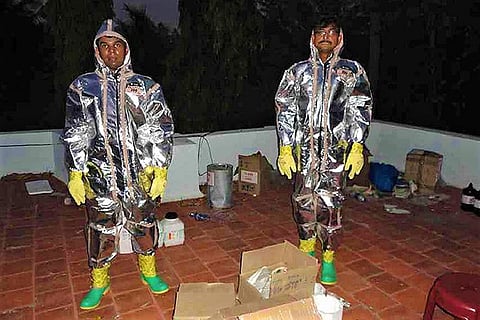

When Masoud Mosavi was first spotted by officers of the Narcotics Control Bureau at the Chennai airport in March 2013, he was carrying a book by Franz Kafka. His literary preferences were a giveaway and would later be useful for the anti-narcotics cops who interrogated him for producing and smuggling methamphetamine from a lab in rural Tamil Nadu.
A former Iranian army man who was an ambulance driver during the Iran-Iraq war through the 80s, Mosavi was a top operative of an Iranian syndicate which was attempting to build meth labs in India and exporting the expensive party drug to destinations in South-East Asia. Mosavi had already established meth labs in Bangkok and Indonesia. But when those labs were compromised, Mosavi’s syndicate chose South India as an operational base to produce meth. Ephedrine, one of the key chemicals needed to make meth, is easily available in India.
But making meth is not easy. It requires chemical expertise, and it is dangerous. And that’s why, Mosavi brought along with him his own meth-cook from Iran – Mehmood Zaffarani.
Lab equipment that was used
The drug being recovered
Through a man who has since been identified only as Rafiq, who is still absconding, Mosavi and Zaffarani were able to set up a meth lab in Sivagangai in rural TN – far away from the usual operative areas of anti-narcotics cops.
The Iranians, however, could not keep the operation running too long. Officers of the NCB got a tip-off in early 2013 from an informer that an Iranian national was operating a meth lab in TN, and that he would be arriving in Chennai airport soon. NCB officers spotted him at the Chennai airport, followed him all the way to a house on the Thirupattur-Pudukottai road in Sivaganga and busted the lab. More than 5kg of meth was seized, along with lab equipment used to produce it.
Two others - Shaukat Ali and Naushad Attar, were also arrested for their role in supplying the ephedrine to the Iranians. The owner of the house in Sivaganga, Kaliammal, was also arrested.
The accused
On Friday, March 9, 2018, an NDPS Special Court in Pudukottai convicted all the five accused in the case, sentencing them to 20 years of rigorous imprisonment.
Rare case, speedy conviction
“It was one of the first such cases in India,” recalls Prem Anand Sinha, who was then the Zonal Director of NCB in Chennai and a part of the operation. Sinha is now the Joint Commissioner (North) of Greater Chennai Police. The operation was led and supervised by Vijay Kumar, the then Deputy Director General of NCB for South-West Region.
“It was the first meth lab case in Tamil Nadu and only the second meth case in which foreign nationals were involved,” Sinha says.
NCB cops followed the Iranians’ movement for a long time, to try and trace their entire network from Chennai to Sivaganga.
After the meth bust, which grabbed headlines in India, NCB officers were also surprised to find how good the meth was. “The cook was a pro, they were producing a very high-quality product. So, we knew they were part of a large syndicate and that securing a conviction was very important,” Sinha says.
Chemical formula on the wall
Heating equipment
Chemicals used
In most drug cases, getting a conviction is not easy as during the busts, there are no witnesses around. “The case is based on official evidence – officers’ testimony and official records. So, it is difficult to get convictions,” Sinha says. But in this case, the Iranians made it even more difficult – they said that they did not know English and could not communicate with the police.
The thinking of an alert intelligence officer at Chennai airport proved useful here. They had spotted the Kafka book with Mosavi when he had landed at the airport. If he did not know English, then why did he have a novel by Kafka in English? Mosavi was confronted with this fact during interrogation, and he broke under the pressure and divulged details about the operation.
It was learnt from him that they were supplying the drug to Japan and Australia too. This case had international ramifications, and seizures were made in Sydney, Paris and Tokyo.
“It feels good, it will definitely set a strong precedent. We got a conviction in a short period comparatively and no one was acquitted. Faster convictions can help us control the crime,” says Sinha.
NCB officers say that the last they heard, Masoud Mosavi was teaching English to other inmates in prison.